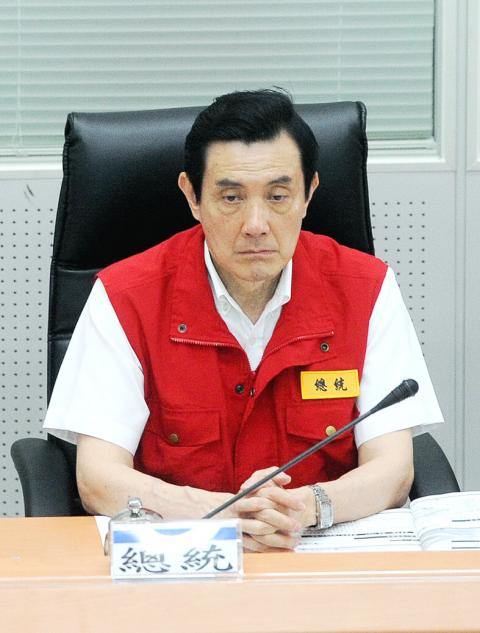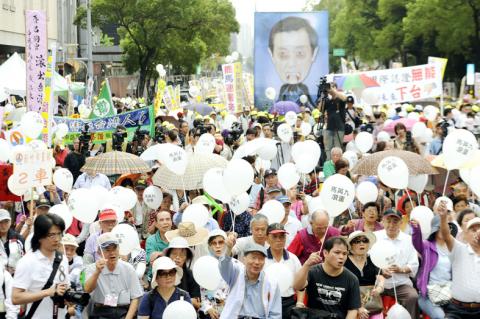The Democratic Progressive Party (DPP) yesterday urged President Ma Ying-jeou (馬英九) to steer the nation back in the right direction — the anniversary of first and Ma’s second-term inaugurations — but said that now is not the right time to impeach him.
“While we think Ma deserves to be recalled, now is not the right time to do so because the country is embroiled in a diplomatic row with the Philippines,” DPP Chairman Su Tseng-chang (蘇貞昌) told a press conference, referring to Taipei’s engagement with Manila over the shooting of Taiwanese fisherman Hung Shih-cheng (洪石成) by Philippine Coast Guard personnel on May 9.
The DPP said that the diplomatic tussle with the Philippines was why it was not supporting the Taiwan Solidarity Union (TSU) in the latter’s proposal to impeach the president, as it did last year.

Photo: Wang Min-wei, Taipei Times
Reviewing Ma’s performance over the past five years, the DPP said the nation has been a chaos under his rule and submitted an appeal listing eight issues Ma should tackle in the remaining three years of his term.
The party urged Ma to halt the construction of the controversial Fourth Nuclear Power Plant in New Taipei City’s (新北市) Gongliao District (貢寮) and hold a national referendum on the plant.
The president should also conduct a comprehensive review of Taiwan’s economic situation and structure before putting forward a long-term recovery plan to improve national competitiveness, Su said.

Photo: Chen Chih-chu, Taipei Times
The DPP also called for the establishment of a 12-year compulsory education system, the formulation of a sustainable and fair pension system and the implementation of a 10-year long-term care program — a national program initiated by the former DPP administration that was shelved after Ma took office — to look after the needs of the nation’s aging population.
It was also imperative to review the nation’s administrative partitioning and national planning since the number of special municipalities would increase to six next year from the original two in 2010, meaning that new issues in areas such as local finances would likely emerge, Su said.
Finally, the DPP demanded that Ma fight corruption, reform the judicial system and bolster defense and foreign policy.
Former DPP chairperson Tsai Ing-wen (蔡英文) said on her Facebook page yesterday that Ma’s seemingly ambitious reform efforts were “fast-food” reforms that only touch upon the surface of a problem without going into the core of the matter.
Tsai urged Ma to listen to the public as he completes his term and tackle Taiwan’s structural challenges from a long-term perspective.
Meanwhile, the TSU told protesters at a rally in front of the Legislative Yuan in Taipei that it would submit a legislative proposal to recall the president for his poor governance during the past five years.
TSU Chairman Huang Kun-huei (黃昆輝) said the TSU launched a recall petition a year ago that has collected about 830,000 signatures.
“With only three legislators, the TSU caucus is small, but it is confident it will winn support from the public and lawmakers from other parties,” Huang told hundreds of protesters amid the honking of car horns by taxi drivers to show their support of the rally.
A DPP-TSU joint motion to impeach Ma was voted off the agenda by the legislature’s Procedure Committee in May last year, five days before the end of Ma’s first term.
The Presidential and Vice Presidential Election and Recall Act (總統副總統選舉罷免法) stipulates that a recall proposal can only be made with the support of at least one-quarter of the total members of the legislature and can only pass if it gets the approval of at least two-thirds of all lawmakers.
The act further states that a president or vice president who has not been in their position for a full year may not be recalled.
The TSU listed 10 reasons for launching a new recall campaign, including Ma’s failure to deliver on his campaign pledges, his pro-China position, poor economic and financial performance, failure to fight corruption and oppression of media freedom under his tenure, among others.
TSU Secretary-General Lin Chih-chia (林志嘉) said the party has also launched an online petition and hoped to collect 1 million signatures by next month.
In related news, DPP spokesperson Lin Chun-hsien (林俊憲) said the government must hold its officials — in particular Minister of Finance Chang Sheng-ford (張盛和) — responsible for the capital gains tax on securities transactions accountable for their the hasty and flawed implementation of the policy.
The Ma administration and the Chinese Nationalist Party (KMT) ignored the DPP’s proposal and insisted on adopting the KMT’s “inferior” initiative, which introduced a 8,500-point threshold on the TAIEX for the tax to be implemented, Lin said.
“Less than five months after the tax proposal was passed, the administration is now considering revising the regulations again. Someone has to be held accountable for this mess,” Lin said.
Separately, DPP members said that Ma had fallen asleep during a press conference at the Central Disaster Emergency Operation Center to oversee state flood-prevention efforts, adding that the nap had been caught on film.

‘ABUSE OF POWER’: Lee Chun-yi allegedly used a Control Yuan vehicle to transport his dog to a pet grooming salon and take his wife to restaurants, media reports said Control Yuan Secretary-General Lee Chun-yi (李俊俋) resigned on Sunday night, admitting that he had misused a government vehicle, as reported by the media. Control Yuan Vice President Lee Hung-chun (李鴻鈞) yesterday apologized to the public over the issue. The watchdog body would follow up on similar accusations made by the Chinese Nationalist Party (KMT) and would investigate the alleged misuse of government vehicles by three other Control Yuan members: Su Li-chiung (蘇麗瓊), Lin Yu-jung (林郁容) and Wang Jung-chang (王榮璋), Lee Hung-chun said. Lee Chun-yi in a statement apologized for using a Control Yuan vehicle to transport his dog to a

Taiwan yesterday denied Chinese allegations that its military was behind a cyberattack on a technology company in Guangzhou, after city authorities issued warrants for 20 suspects. The Guangzhou Municipal Public Security Bureau earlier yesterday issued warrants for 20 people it identified as members of the Information, Communications and Electronic Force Command (ICEFCOM). The bureau alleged they were behind a May 20 cyberattack targeting the backend system of a self-service facility at the company. “ICEFCOM, under Taiwan’s ruling Democratic Progressive Party, directed the illegal attack,” the warrant says. The bureau placed a bounty of 10,000 yuan (US$1,392) on each of the 20 people named in

The High Court yesterday found a New Taipei City woman guilty of charges related to helping Beijing secure surrender agreements from military service members. Lee Huei-hsin (李慧馨) was sentenced to six years and eight months in prison for breaching the National Security Act (國家安全法), making illegal compacts with government employees and bribery, the court said. The verdict is final. Lee, the manager of a temple in the city’s Lujhou District (蘆洲), was accused of arranging for eight service members to make surrender pledges to the Chinese People’s Liberation Army in exchange for money, the court said. The pledges, which required them to provide identification

INDO-PACIFIC REGION: Royal Navy ships exercise the right of freedom of navigation, including in the Taiwan Strait and South China Sea, the UK’s Tony Radakin told a summit Freedom of navigation in the Indo-Pacific region is as important as it is in the English Channel, British Chief of the Defence Staff Admiral Tony Radakin said at a summit in Singapore on Saturday. The remark came as the British Royal Navy’s flagship aircraft carrier, the HMS Prince of Wales, is on an eight-month deployment to the Indo-Pacific region as head of an international carrier strike group. “Upholding the UN Convention on the Law of the Sea, and with it, the principles of the freedom of navigation, in this part of the world matters to us just as it matters in the